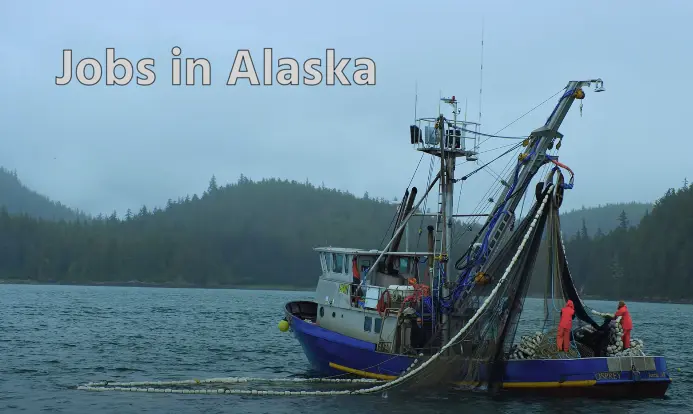Working in Alaska can be a unique and rewarding experience for those who enjoy adventure, outdoor activities, and breathtaking scenery. The state is known for its natural resources, including oil, gas, fish, and minerals, which contribute significantly to the local economy.
According to the Bureau of Labor Statistics, the unemployment rate in Alaska was 5.8% in December 2020, which is lower than the national average of 6.7%.
This means that there are plenty of job opportunities available in the state, particularly in the industries of healthcare, tourism, transportation, and construction.
One of the advantages of working in Alaska is the high pay rates. Due to the remote location and harsh weather conditions, many employers compensate their employees with higher salaries and generous benefits packages. For example, the Alaska Permanent Fund Dividend, a legal distribution of the state’s oil wealth to eligible residents, paid out $992 to each Alaskan in 2020. Workers in the fishing industry can earn up to $20,000 or more during salmon season, while nurses and physicians in remote areas can earn up to six-figure salaries.
Moreover, working in Alaska can provide opportunities for personal growth and development. Employees can gain valuable skills and knowledge in areas such as wilderness survival, navigation, and wildlife management. Additionally, the state is home to diverse cultures and communities, allowing workers to learn about and appreciate different ways of life. Outdoor recreation is also a major draw, with endless opportunities for hunting, fishing, hiking, skiing, and more.
Jobs in Demand in Alaska in 2024: Top 7 Occupations
Alaska’s job market is rapidly evolving, and with abundant natural resources and a growing economy, it is an excellent place to build a career. According to the Alaska Occupational Forecast 2020-2030, here are the top seven jobs in demand in Alaska in 2024:
- Civil Engineers: Plan and design land areas for various projects such as highways, airports, hospitals, and land subdivisions.
- Software Developers: Research, design, develop, and test computer software or related equipment for commercial, industrial, or scientific use.
- Welders: Fabricate and assemble metal structures and equipment using various welding techniques. Welders are among the highest-paid tradesmen in Alaska.
- Mechanical Engineers: Plan, design, and oversee the construction and maintenance of equipment and mechanical systems.
- Electricians: Install and maintain electrical systems and wiring in residential, commercial, and industrial environments.
- Health and Safety Engineers: Promote workplace and product safety by applying knowledge of industrial processes, mechanics, chemistry, psychology, and industrial health and safety laws.
- Environmental Engineers: Plan and design engineering solutions for the prevention, control, and remediation of environmental hazards using various engineering disciplines.
These job occupations offer diverse opportunities for individuals who are willing to work hard, have a strong work ethic, and possess the right skills and knowledge. The annual salary for these professions ranges from $60,000 to $120,000+. However, the pay scale could vary based on different factors like state, company, and level of expertise.
As the demand for skilled workers continues to grow, Alaska presents an excellent opportunity for job seekers looking for a challenging and rewarding career.
Is it dangerous to work in Alaska?
According data from the National Institute of Occupational Safety and Health, Alaska is one of the most dangerous places to work in the United States.
The risk of getting killed on the job in Alaska is nearly five times higher than any other state. This is due to several factors such as the state’s large reliance on outdoor occupations in tough working conditions, the harsh climate, and the state’s relatively small population.
In 2020, at least 83 people died in job-related accidents in Alaska, with fishing, logging, and aviation being the most dangerous jobs.
Transportation-related accidents contribute to approximately 40% of fatal occupational injuries in Alaska. Those working in the transportation industry often include employees above the age of 65 or between the ages of 20 and 24.
The rate of fatal injuries for these age groups is four times higher than for their peers according to the Bureau of Labor Statistics.
While workers’ compensation is available to those who suffer an injury on the job, achieving maximum relief can be a challenge.
Is it easy to find a job in Alaska after a criminal record?
Finding a job in Alaska after having a criminal record can be challenging. While Alaska does not have any state laws that govern pre-employment background checks, an employer must still comply with the Federal Fair Credit Reporting Act and Title VII of the Civil Rights Act of 1964. These laws protect the privacy of consumer information collected by Consumer Reporting Agencies (CRAs) and forbid employers from discriminating against applicants and employees based on their protected characteristics.
If you have a criminal record and are seeking employment in Alaska, it is essential to do your due diligence and conduct a thorough background check on yourself. This allows you to become aware of any adverse information that a potential employer might uncover in a background check. Furthermore, being proactive and honest about your past can show that you are taking responsibility for your actions and are committed to moving forward in a positive direction.
It is crucial to note that employers must individually assess a candidate’s criminal history in relation to the job they are hiring for before deciding against hiring them based solely on that information. Therefore, if you have a criminal record, the severity of the offense and how long ago it occurred must be taken into consideration.
Although it may be more challenging to find employment with a criminal record, it is still possible. One way to increase your chances of finding a job is to seek the assistance of workforce development agencies in Alaska. These agencies offer programs and resources to help individuals with criminal records find meaningful employment. Additionally, networking with people in your desired industry and building a strong professional network can also aid in finding employment opportunities.

Should I bring my family with me if offered a job in Alaska?
If offered a job in Alaska, some may wonder whether they should bring their family with them. While this decision ultimately depends on personal circumstances, there are some important factors to consider. Firstly, it should be noted that Alaska can be an expensive place to live, particularly in terms of housing and groceries. Additionally, depending on the location of the job, access to amenities such as healthcare and schools may be limited. It may also be important to consider the climate and remoteness of certain areas.
That being said, there are also many benefits to living in Alaska. The natural beauty of the state is unparalleled, and there are endless opportunities for outdoor recreation and adventure. Furthermore, employment opportunities can be quite lucrative, particularly in industries such as oil and gas or fishing. Additionally, the sense of community in Alaska is strong and supportive, which can be particularly beneficial for those moving from out of state.






